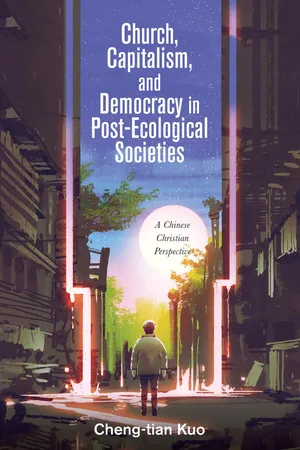
Church, Capitalism, and Democracy in Post-Ecological Societies
A Chinese Christian Perspective
- 242 pages
- English
- ePUB (mobile friendly)
- Available on iOS & Android
About This Book
Most ecotheologies build their arguments on the Bible's creation-story and resurrection-narrative in the hope to save the ecology through spiritual meditation, reforming capitalism, and/or deliberative democracy. However, based on a Chinese Christian social scientist's perspective, this book argues that few of these ecotheologies are theologically and empirically valid. Instead, it proposes a neuro-institutional post-ecology theology that builds on the major themes of the Last Judgment to refocus ecotheology toward evangelism and to adapt ecotheology to capitalism and democracy in order to embrace the "already but not yet" impacts of the inevitable total destruction of the ecology in the near future.The vanities in current ecotheologies are divided into religious, economic, and political categories. Among the major ones discussed in this book are the vanities of ecological meditation theology, leftist and rightist economic theologies, as well as ecotheologies of green authoritarianism and deliberative democracy. Even if these ecotheologies work perfectly as they were intended to, global ecological crises have passed the point of no return (i.e., post-ecology) and rendering all of them a global vanity. Based on a Chinese Christian social scientist's perspective, this book proposes a moderate course of ecological spirituality, economic behaviors, and democratic actions, but with a radical devotion to crisis management and evangelism in preparation for the Doomsdays. This book is unique in its balanced interdisciplinary composition, employing theories from cognitive science, Christian theology, economics, and political science.
Frequently asked questions
Information
Table of contents
- Title Page
- Preface
- Abbreviations of Scripture
- Chapter 1: Introduction: Scientific and Christian Post-Ecology
- Chapter 2: Neuro-Institutional Human
- Chapter 3: Neurotheological Human
- Chapter 4: Church and Post-Ecotheology
- Chapter 5: Capitalism and Post-Ecotheology
- Chapter 6: Democracy and Post-Ecotheology
- Chapter 7: Conclusion: Too Little to Save and Too Many to Save
- Appendix 3.1: Neurotheology in the Bible
- Appendix 4.1: Ecology and Post-Ecology in the Bible
- Bibliography